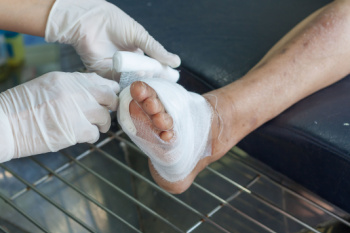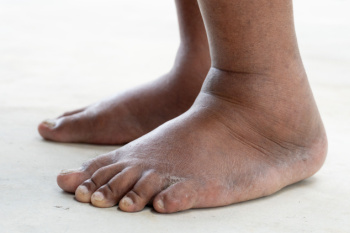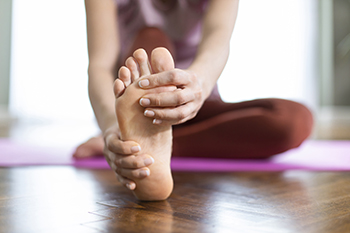Items filtered by date: July 2024
Understanding and Caring for Diabetic Foot Wounds
 Diabetic foot wounds are common complications resulting from a combination of poor circulation and neuropathy, which reduces sensation in the feet. Risk factors can include prolonged high blood sugar levels, which damage blood vessels and nerves, and wearing ill-fitting shoes, which can cause blisters and sores. People with diabetes are more prone to infections due to a weakened immune response. Proper foot care is essential to prevent these wounds. Daily inspections for cuts, blisters, or any changes in skin color are vital. Keeping feet clean and dry, moisturizing to prevent cracking, and wearing comfortable, protective shoes are essential steps. Regular visits to a podiatrist for foot examinations and managing blood sugar levels effectively can also reduce the risk of severe complications. If you have diabetes, it is strongly suggested that you are under the care of a podiatrist who can help you to manage this condition.
Diabetic foot wounds are common complications resulting from a combination of poor circulation and neuropathy, which reduces sensation in the feet. Risk factors can include prolonged high blood sugar levels, which damage blood vessels and nerves, and wearing ill-fitting shoes, which can cause blisters and sores. People with diabetes are more prone to infections due to a weakened immune response. Proper foot care is essential to prevent these wounds. Daily inspections for cuts, blisters, or any changes in skin color are vital. Keeping feet clean and dry, moisturizing to prevent cracking, and wearing comfortable, protective shoes are essential steps. Regular visits to a podiatrist for foot examinations and managing blood sugar levels effectively can also reduce the risk of severe complications. If you have diabetes, it is strongly suggested that you are under the care of a podiatrist who can help you to manage this condition.
Diabetic foot care is important in preventing foot ailments such as ulcers. If you are suffering from diabetes or have any other concerns about your feet, contact one of our podiatrists from Prince William Foot & Ankle Center, PC. Our practitioners can provide the care you need to keep you pain-free and on your feet.
Diabetic Foot Care
Diabetes affects millions of people every year. The condition can damage blood vessels in many parts of the body, especially the feet. Because of this, taking care of your feet is essential if you have diabetes, and having a podiatrist help monitor your foot health is highly recommended.
The Importance of Caring for Your Feet
- Routinely inspect your feet for bruises or sores.
- Wear socks that fit your feet comfortably.
- Wear comfortable shoes that provide adequate support.
Patients with diabetes should have their doctor monitor their blood levels, as blood sugar levels play such a huge role in diabetic care. Monitoring these levels on a regular basis is highly advised.
It is always best to inform your healthcare professional of any concerns you may have regarding your feet, especially for diabetic patients. Early treatment and routine foot examinations are keys to maintaining proper health, especially because severe complications can arise if proper treatment is not applied.
If you have any questions please feel free to contact our offices located in Gainesville and Dulles, VA . We offer the newest diagnostic and treatment technologies for all your foot and ankle needs.
Foot Swelling Caused by Psoriatic Arthritis
 Psoriatic arthritis can cause swelling in the feet, making daily activities such as walking and wearing shoes very uncomfortable. This condition is a type of inflammatory arthritis that can cause inflammation in the joints and tissues of the feet that results in swelling and stiffness. The swelling may also be accompanied by pain, tenderness, and redness further impacting mobility and quality of life. When individuals with psoriatic arthritis experience flare-ups of symptoms, the swelling and discomfort in the feet can become worse. Managing psoriatic arthritis involves a thorough approach that can include medication, physical therapy, and lifestyle adjustments. Podiatrists, or foot doctors, can offer specialized care for foot-related symptoms of psoriatic arthritis. Some recommendations are supportive footwear, orthotic inserts, and exercises to improve mobility and reduce discomfort. If you have psoriatic arthritis and are experiencing swelling in your feet, it is suggested that you schedule an appointment with a podiatrist for treatment.
Psoriatic arthritis can cause swelling in the feet, making daily activities such as walking and wearing shoes very uncomfortable. This condition is a type of inflammatory arthritis that can cause inflammation in the joints and tissues of the feet that results in swelling and stiffness. The swelling may also be accompanied by pain, tenderness, and redness further impacting mobility and quality of life. When individuals with psoriatic arthritis experience flare-ups of symptoms, the swelling and discomfort in the feet can become worse. Managing psoriatic arthritis involves a thorough approach that can include medication, physical therapy, and lifestyle adjustments. Podiatrists, or foot doctors, can offer specialized care for foot-related symptoms of psoriatic arthritis. Some recommendations are supportive footwear, orthotic inserts, and exercises to improve mobility and reduce discomfort. If you have psoriatic arthritis and are experiencing swelling in your feet, it is suggested that you schedule an appointment with a podiatrist for treatment.
Swollen feet can be a sign of an underlying condition. If you have any concerns, contact one of our podiatrists of Prince William Foot & Ankle Center, PC. Our practitioners can provide the care you need to keep you pain-free and on your feet.
Swollen feet are a common ailment among pregnant women and people who stand or sit for extended periods. Aging may increase the possibility of swollen feet and patients who are obese often notice when their feet are swelling too. There may be medical reasons why swollen feet occur:
- Phlebitis - A condition that causes the veins to become inflamed and can also cause leg pain.
- Liver disease - This may lead to low blood levels of albumin which is a protein. This can cause fluid in the blood to pass into the tissues and several areas of the body can become swollen.
- Heart failure - When the heart doesn’t pump properly the blood that is normally pumped back to the heart can pool in the veins of the legs causing swollen feet.
- Kidney disease - One of the main functions of the kidneys is releasing excess fluid in the body. This type of condition can make it difficult for the kidneys to function properly, and as a result the feet may become swollen.
- Deep-vein thrombosis (DVT)- This is a serious condition where blood clots form in the veins of the legs. They can block the return of blood from the legs to the heart which may cause the feet to swell. It is important to be treated by a podiatrist if this condition is present.
Swollen feet can also be caused by bone and tendon conditions, including fractures, arthritis, and tendinitis. Additionally, there may be skin and toenail conditions and an infection may cause the feet to swell. Patients who take medicine to treat high blood pressure may be prone to getting swollen feet.
Many patients elevate their feet to help relieve the swelling and this is generally a temporary remedy. When a podiatrist is consulted the reason behind the swelling can be uncovered and subsequently treated.
If you have any questions please feel free to contact our offices located in Gainesville and Dulles, VA . We offer the newest diagnostic tools and technology to treat your foot and ankle needs.
Finding Running Shoes for Your Child

Finding the perfect pair of running shoes for your child involves more than just picking the trendiest style off the shelf. It's about ensuring that their feet are properly supported and protected, especially during their active play and sports activities. Look for features, such as arch support, a shock-absorbing sole, firm heel support, and easy-to-fasten closures like laces or Velcro. Prioritize fit by having your child's feet measured for both length and width, and make sure they try on several pairs to find the best match for their foot shape. Remember that shoe sizes can vary between brands, so focus on how the shoe feels rather than the number on the label. Pay attention to details like toe wiggle room, snug yet comfortable heel fit, and proper alignment of the ball of the foot. And don't forget, a good shoe should feel comfortable right from the start. There shouldn't be a need to break them in. If you're unsure about the fit or need help with a specific foot problem, it is suggested that you make an appointment with a podiatrist who can offer tailored recommendations based on your child's specific needs.
Making sure that your children maintain good foot health is very important as they grow. If you have any questions, contact one of our podiatrists of Prince William Foot & Ankle Center, PC. Our practitioners can provide the care you need to keep you pain-free and on your feet.
Keeping Children's Feet Healthy
Having healthy feet during childhood can help prevent medical problems later in life, namely in the back and legs. As children grow, their feet require different types of care. Here are some things to consider...
Although babies do not walk yet, it is still very important to take care of their feet.
Avoid putting tight shoes or socks on his or her feet.
Allow the baby to stretch and kick his or her feet to feel comfortable.
As a toddler, kids are now on the move and begin to develop differently. At this age, toddlers are getting a feel for walking, so don’t be alarmed if your toddler is unsteady or ‘walks funny’.
As your child gets older, it is important to teach them how to take care of their feet.
Show them proper hygiene to prevent infections such as fungus.
Be watchful for any pain or injury.
Have all injuries checked by a doctor as soon as possible.
Comfortable, protective shoes should always be worn, especially at play.
If you have any questions please feel free to contact our offices located in Gainesville and Dulles, VA . We offer the newest diagnostic and treatment technologies for all your foot and ankle needs.
Heel Pain Can Be Treated!
Key Factors and Tips About Ankle Injuries While Running

Ankle injuries while running are common and can be caused by several factors. Overtraining often leads to fatigue, increasing the risk of improper form and accidents. Muscle strains can occur from inadequate warm-ups or sudden increases in intensity. Wearing the wrong shoes, especially those lacking proper support, can lead to instability and misalignment. To prevent these injuries, it is essential to incorporate rest days into your training schedule to allow muscles to recover. Ensuring a thorough warm-up before running can prepare muscles and reduce the risk of strains. Investing in high-quality running shoes that provide adequate support and cushioning is essential for maintaining proper form and stability. Listening to your body and avoiding pushing through pain can also help prevent serious injuries. If you have sudden or chronic ankle pain from running, it is suggested that you visit a podiatrist who can effectively treat this condition.
Ankle and foot injuries are common among athletes and in many sports. They can be caused by several problems and may be potentially serious. If you are feeling pain or think you were injured in a sporting event or when exercising, consult with one of our podiatrists from Prince William Foot & Ankle Center, PC. Our practitioners will assess your condition and provide you with quality foot and ankle treatment.
Common Injuries
The most common injuries that occur in sporting activities include:
- Achilles Tendonitis
- Achilles Tendon Rupture
- Ankle Sprains
- Broken Foot
- Plantar Fasciitis
- Stress Fractures
- Turf Toe
Symptoms
Symptoms vary depending upon the injury and in some cases, there may be no symptoms at all. However, in most cases, some form of symptom is experienced. Pain, aching, burning, bruising, tenderness, tightness or stiffness, sensation loss, difficulty moving, and swelling are the most common symptoms.
Treatment
Just as symptoms vary depending upon the injury, so do treatment options. A common treatment method is known as the RICE method. This method involves rest, applying ice, compression and elevating the afflicted foot or ankle. If the injury appears to be more serious, surgery might be required, such as arthroscopic or reconstructive surgery. Lastly, rehabilitation or therapy might be needed to gain full functionality in the afflicted area. Any discomfort experienced by an athlete must be evaluated by a licensed, reputable medical professional.
If you have any questions, please feel free to contact our offices located in Gainesville and Dulles, VA . We offer the newest diagnostic and treatment technologies for all your foot care needs.
Raynaud's Phenomenon Can Lead to Toe Pain
 Raynaud's phenomenon is a condition characterized by episodic narrowing of the blood vessels in response to cold or stress, leading to reduced blood flow. This typically affects the fingers and toes, causing them to turn white, blue, and then red as blood flow returns. The exact cause is not well understood, but it involves overreaction of the blood vessels to cold or emotional stress. When the toes are affected, the reduced blood flow can lead to pain, numbness, and tingling. During an episode, toes may feel cold and painful, and, as circulation improves, they may throb or swell. To manage Raynaud's phenomenon, it is important to keep the feet warm and avoid triggers such as cold temperatures and stress. Wearing warm socks and footwear, and managing stress through relaxation techniques can help prevent episodes. In severe cases, medications may be prescribed to improve blood flow. For persistent or severe symptoms, it is suggested that you visit a podiatrist for a comprehensive treatment plan.
Raynaud's phenomenon is a condition characterized by episodic narrowing of the blood vessels in response to cold or stress, leading to reduced blood flow. This typically affects the fingers and toes, causing them to turn white, blue, and then red as blood flow returns. The exact cause is not well understood, but it involves overreaction of the blood vessels to cold or emotional stress. When the toes are affected, the reduced blood flow can lead to pain, numbness, and tingling. During an episode, toes may feel cold and painful, and, as circulation improves, they may throb or swell. To manage Raynaud's phenomenon, it is important to keep the feet warm and avoid triggers such as cold temperatures and stress. Wearing warm socks and footwear, and managing stress through relaxation techniques can help prevent episodes. In severe cases, medications may be prescribed to improve blood flow. For persistent or severe symptoms, it is suggested that you visit a podiatrist for a comprehensive treatment plan.
Toe pain can disrupt your daily activities. If you have any concerns, contact one of our podiatrists of Prince William Foot & Ankle Center, PC. Our practitioners can provide the care you need to keep you pain-free and on your feet.
What Causes Toe Pain?
Most severe toe pain is caused due to a sports injury, trauma from dropping something heavy on the toe, or bumping into something rigid. Other problems can develop over time for various reasons.
Toe pain can be caused by one or more ailments. The most common include:
- Trauma
- Sports injury
- Wearing shoes that are too tight
- Arthritis
- Gout
- Corns and calluses
- Hammertoe
- Bunions
- Blisters
- Ingrown toenails
- Sprains
- Fractures (broken bones)
- Dislocations
When to See a Podiatrist
- Severe pain
- Persistent pain that lasts more than a week
- Signs of infection
- Continued swelling
- Pain that prevents walking
Diagnosis
In many cases the cause of toe pain is obvious, but in others, a podiatrist may want to use more advanced methods to determine the problem. These can range from simple visual inspections and sensation tests to X-rays and MRI scans. Prior medical history, family medical history, and any recent physical traumatic events will all be taken into consideration for a proper diagnosis.
Treatment
Treatments for toe pain and injuries vary and may include shoe inserts, padding, taping, medicines, injections, and in some cases, surgery. If you believe that you have broken a toe, please see a podiatrist as soon as possible.
If you have any questions please feel free to contact our offices located in Gainesville and Dulles, VA . We offer the newest diagnostic tools and technology to treat your foot and ankle needs.


